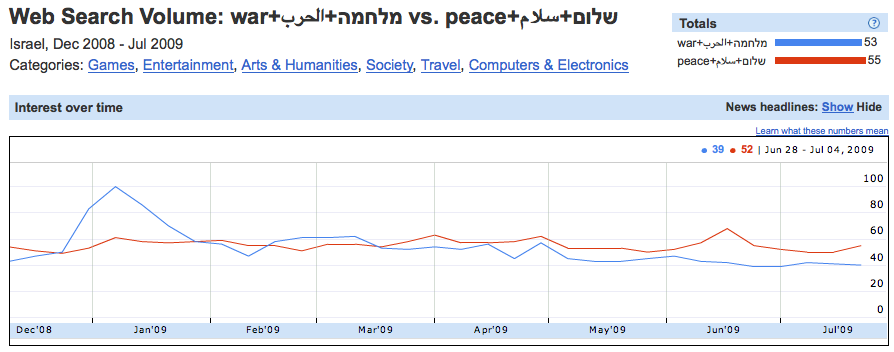The Cloud of War
July 24th, 2009 — Scott HartleyAs examined in “Orwell’s Google Search for Peace,” Google Internet search query data can provide useful insight. In observing the prevalence of proper nouns, such as electoral candidate names, linguistic variation is uncommon and need not be examined. For example, interest in “Obama” around the world does not vary according to local language. Observing the online prevalence of nouns such as “war” and “peace,” linguistic nuance does help broaden the scope of the observation. Google Insights for Search allows for semantic nuance through the use of language, “+” or statements, and adding “-” negative queries to preclude similar, but unrelated, queries from slanting results.
Below, I focus on three Middle East geographies in particular, Iraq, Israel, and the Palestinian Territories, observing the terms “war” and “peace” across three languages: Arabic, English, and Hebrew. The “Fog of War” was once used to describe the level of ambiguity in situational awareness in battle. Today, Google is allowing us to understand what should be known as the “Cloud of War” by observing conflict and reconciliation via online search interest.
IRAQ
Though search query data only goes back as far as 2004, and the initiation of the Iraq War came in March 2003, throughout the period of observation (from 2004-present) “war + מלחמה + الحرب” always outpaced “peace + שלום + سلام.” The largest spike in relative online traffic on linguistic variants of “war” came in October 2007. A comparison with Google News volume during the same month indicates a corresponding expansion of press coverage.
ISRAEL
In Israel, despite a history of fairly evenly distributed Internet search queries on Arabic, English, and Hebrew versions of “war” and “peace,” there is a spike in search on war terms coinciding with the Israeli January 3-18, 2009 invasion of Gaza. Israeli Google search on war reached its peak between January 4-10, 2009. What is noteworthy, however, is that Israeli queries on “war” subsided, and by the week of January 25-31 –only seven days after the January 18, 2009 troop withdrawal from Gaza– they were again commensurate with “peace” queries. What appears to be a blip in Israeli Internet focus is not quite so unpronounced in the Palestinian Territories.
PALESTINIAN TERRITORIES
In the Palestinian Territories, Google search query traffic spiked on variants of the term “war” corresponding with the Israeli invasion of Gaza. Despite a history –since 2006– of commensurate “war” and “peace” search volume, the January 3-18, 2009 events had a lingering effect online. Whereas Israeli query volume on “war” fell to levels of “peace” by January 25, Palestinian query volume on “war” failed to fully subside until June 23.
What reconciliation, online, had taken one week in Israel had taken six-months in the Palestinian Territories. As one additional data point for understanding mutual grievances across conflict zones, the “Cloud of War” is useful.
*Though Israel chart lists specific categories, “All Categories” selection was held constant across comparisons.









 Click Here
Click Here
July 27th, 2009 at 11:08 pm
[…] Internet search analytics on proper nouns, such as electoral candidates or even Bollywood stars such as Shahrukh Khan, can be easily monitored. Recently, I’ve begun exploring Google Internet search query data on antonyms, such as war and peace. In a recent post for Harvard’s Internet & Democracy blog, I found that contrary to rankings on the Global Peace Index, the most “peaceful” nations were often those most searching for “war” terms online. I likened online “war” and “peace” to Orwell, not Tolstoy. On Friday I broadened this query by looking across languages in three regions in the Middle East: Iraq, Israel, and the Palestinian Territories. In the wake of the Gaza War, and the January Israeli offensive, Israeli Internet search queries on “war” diminished to pre-war levels within one week, finding parity with queries on “peace.” In the Palestinian territories, however, this reduction in volume took six months. In short, the Gaza offensive created only a blip in Israeli Internet user focus on war, but search queries on “war” persisted for over 25 times as long among Palestinian Internet u…. […]